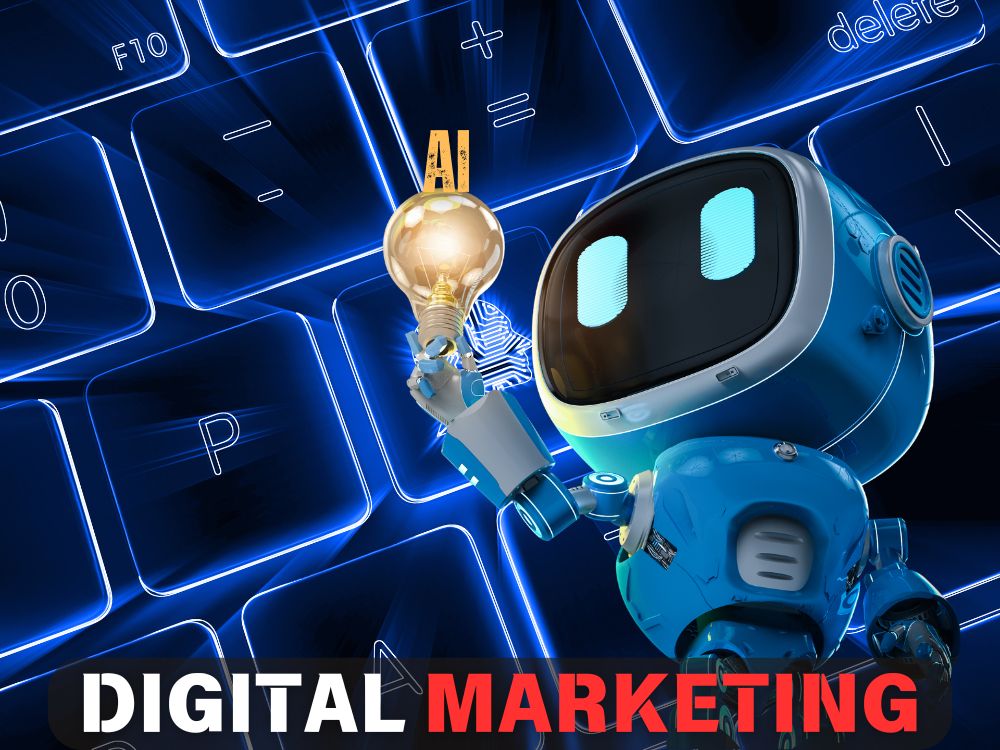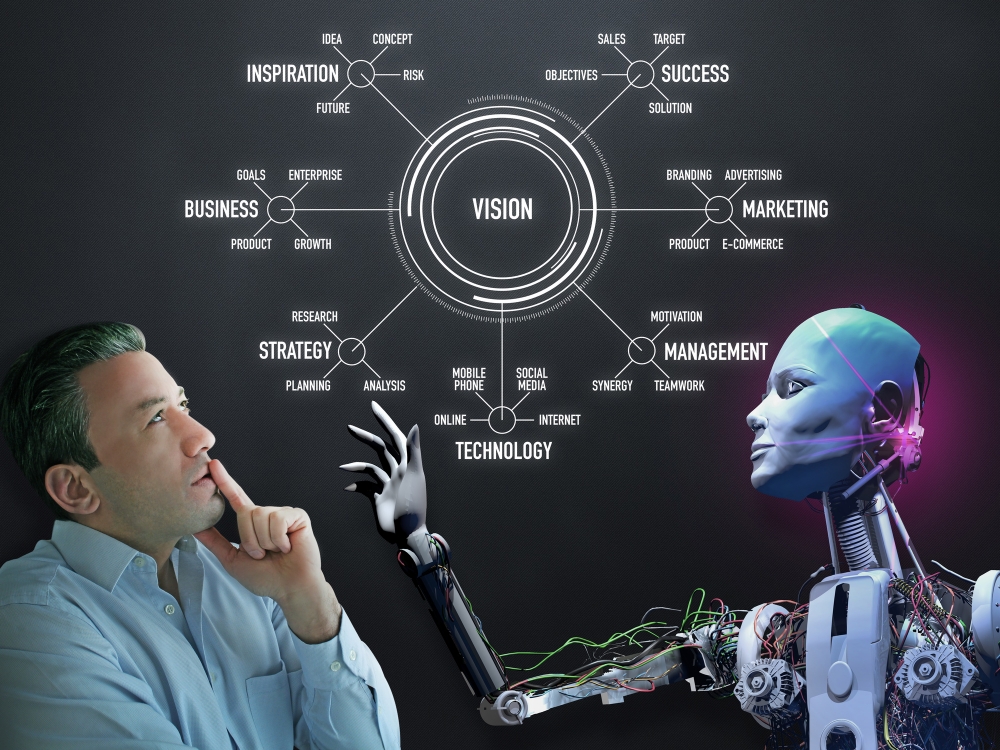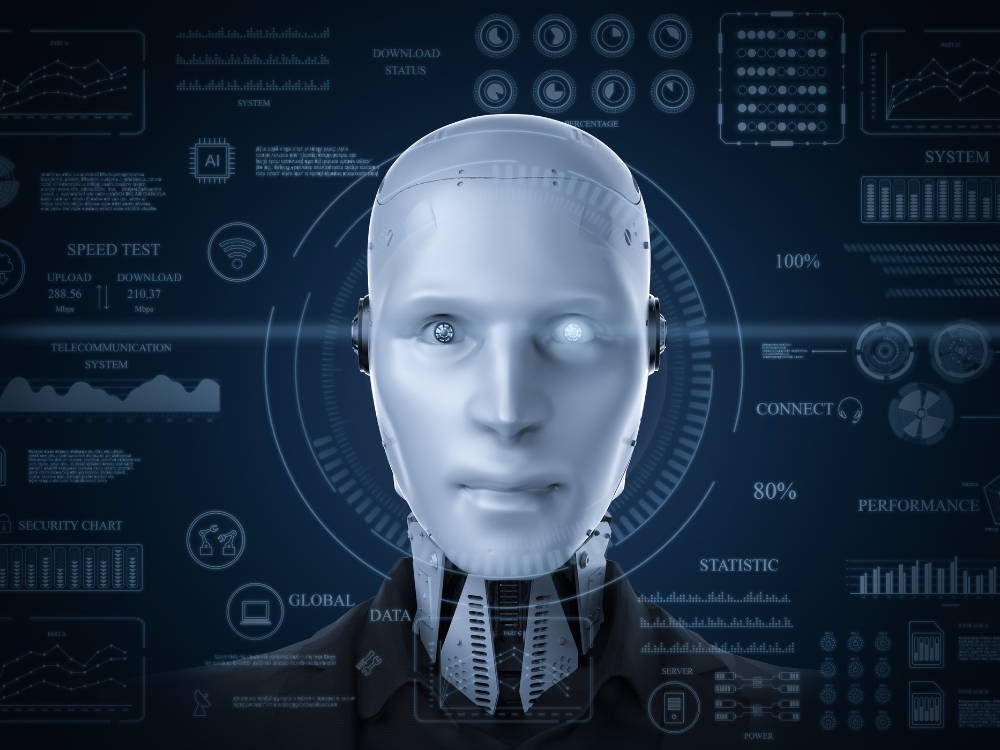
Are you ready to revolutionize your marketing strategy? 🚀 Artificial Intelligence (AI) is no longer just a buzzword—it’s reshaping the business landscape at breakneck speed. As we hurtle towards 2025, companies that aren’t leveraging AI in their marketing efforts risk being left in the dust.
But here’s the problem: Many businesses are overwhelmed by the complexity of AI marketing. They’re unsure where to start, which tools to use, or how to implement AI strategies effectively. This uncertainty can lead to missed opportunities and competitive disadvantages. Don’t let that be you!
In this comprehensive guide, we’ll demystify AI marketing and equip you with the knowledge you need to thrive in the AI-driven future. From understanding the basics to exploring cutting-edge trends, we’ll cover everything you need to know to prepare your business for AI marketing success. Let’s dive into the world of AI marketing and discover how it can transform your business before 2025!

Basics of AI in Digital Marketing
A. Definition and core concepts
AI marketing refers to the use of artificial intelligence technologies to automate, optimize, and enhance marketing processes and decision-making. At its core, AI marketing leverages machine learning algorithms, data analytics, and natural language processing to deliver personalized, efficient, and data-driven marketing strategies.
Key concepts in AI marketing include:
- Predictive analytics
- Automated decision-making
- Natural language processing
- Machine learning
- Big data analysis
B. Evolution of AI in Digital Marketing
The evolution of AI in digital marketing has been rapid and transformative:
| Era | Characteristics |
|---|---|
| Pre-AI | Manual data analysis, broad targeting |
| Early AI | Basic automation, rule-based systems |
| Current AI | Advanced personalization, predictive analytics |
| Future AI | Hyper-personalization, autonomous marketing |
As AI technologies have advanced, marketing strategies have become increasingly sophisticated, moving from simple automation to complex, real-time decision-making systems.
C. Key technologies driving AI marketing
Several cutting-edge technologies are propelling AI marketing forward:
- Machine Learning: Enables systems to learn and improve from experience without explicit programming.
- Natural Language Processing (NLP): Allows AI to understand and generate human language, crucial for chatbots and content creation.
- Computer Vision: Facilitates image and video analysis for visual content optimization.
- Predictive Analytics: Uses historical data to forecast future trends and behaviors.
- Big Data Processing: Handles vast amounts of data to extract meaningful insights.
These technologies work in concert to create powerful AI marketing tools that can analyze consumer behavior, optimize ad placements, personalize content, and automate customer interactions at scale.
Now that we’ve covered the fundamentals of AI marketing, let’s explore the specific benefits it offers to businesses in the next section.

Benefits of AI Marketing for Businesses
A. Enhanced customer targeting and personalization
AI-powered marketing tools revolutionize customer targeting and personalization, enabling businesses to deliver tailored experiences at scale. By analyzing vast amounts of customer data, AI algorithms can identify patterns and preferences, allowing marketers to create highly targeted campaigns.
| Traditional Marketing | AI-Enhanced Marketing |
|---|---|
| Generic messaging | Personalized content |
| Broad audience targeting | Precise segmentation |
| Manual analysis | Real-time insights |
B. Improved efficiency and cost-effectiveness
AI marketing tools significantly boost operational efficiency and reduce costs. Automating repetitive tasks frees up valuable time for marketers to focus on strategy and creativity.
- Streamlined workflow processes
- Reduced human error
- Optimized resource allocation
- Faster campaign execution
C. Data-driven decision making
AI empowers businesses to make informed decisions based on comprehensive data analysis. Machine learning algorithms can process and interpret complex datasets, uncovering valuable insights that might otherwise go unnoticed.
D. Marketing Automation
AI-driven marketing automation enhances campaign management and execution. From email marketing to social media posting, AI tools can handle multiple tasks simultaneously, ensuring consistent and timely communication with customers.
E. Predictive analytics and forecasting
Leveraging AI for predictive analytics allows businesses to anticipate market trends and customer behavior. This foresight enables proactive strategy adjustments and more accurate resource planning.
| Predictive Analytics Benefits |
|---|
| Improved inventory management |
| Optimized pricing strategies |
| Enhanced customer lifetime value predictions |
| More accurate sales forecasting |
By harnessing these AI-powered capabilities, businesses can gain a competitive edge, improve ROI, and deliver superior customer experiences. As we move forward, let’s explore the essential AI marketing tools and platforms that can help you implement these strategies effectively.

Essential AI Marketing Tools and Platforms
Now that we’ve explored the benefits of AI marketing for businesses, let’s dive into the essential tools and platforms that can help you implement these strategies effectively.
- AI CRM Systems
- AI-Powerd Marketing Platforms
- Chatbots and virtual assistant
- Programmatic advertising AI
- Personalized at sale
- Content Creation and Optimization Tools
A. Customer Relationship Management (CRM) Systems
AI-powered CRM systems are revolutionizing how businesses manage customer interactions. These tools use machine learning algorithms to:
- Predict customer behavior
- Automate personalized communications
- Analyze customer data
- Predictive Analytics software
| CRM System | Key AI Features | Best For |
|---|---|---|
| Salesforce Einstein | Predictive lead scoring, automated task prioritization | Large enterprises |
| HubSpot CRM | Conversation intelligence, predictive lead scoring | SMBs and startups |
| Zoho CRM | Zia AI assistant, lead prediction | Mid-sized businesses |
Several platforms leverage AI to enhance various aspects of marketing:
B. AI-Powered Marketing Platforms
- HubSpot AI: Offers content creation assistance and predictive analytics
- Jasper: Specializes in AI-generated content for various marketing channels
C. Chatbots and Virtual Assistants
AI-driven chatbots are becoming increasingly sophisticated, offering:
- 24/7 customer support
- Personalized product recommendations
- Automated lead qualification
Top 5 Chatbots:
- Tidio
- MobileMonkey
- ManyChat
- Chatfuel
- HubSpot Chatbot
D. Programmatic Advertising Platforms
These platforms use AI to optimize ad placement and bidding in real-time, improving ROI. Examples include:
- Google Ads
- The Trade Desk
- MediaMath
Read More: AI and Programmatic Advertising: A Marketer’s Guide
E. Personalization at Scale
AI enables marketers to deliver personalized experiences across various touchpoints:
- Dynamic website content
- Tailored email campaigns
- Customized product recommendations
F. Content Creation and Optimization Tools
AI is transforming content marketing with tools that can:
- Generate blog post ideas
- Write social media captions
- Optimize content for SEO
AI-Powered Content Creation: The Future of Marketing
G. Predictive Analytics Software
These tools use historical data to forecast future trends and customer behaviors, enabling proactive marketing strategies. You can enhanced decision-making and strategy formulation.
H. Brief Comparison, Pricing, Pros, and Cons
| Tool Category | Average Pricing | Pros | Cons |
|---|---|---|---|
| CRM Systems | $50-$300/user/month | Centralized data, automation | Learning curve, data migration |
| AI Marketing Platforms | $100-$3000/month | Comprehensive features | Can be expensive for small businesses |
| Chatbots | $0-$1000/month | 24/7 availability, scalability | Limited complex problem-solving |
| Programmatic Advertising | % of ad spend | Real-time optimization | Requires significant data |
| Personalization Tools | $50-$500/month | Improved user experience | Privacy concerns |
| Content Tools | $29-$500/month | Time-saving, consistency | May lack human creativity |
| Predictive Analytics | $100-$5000/month | Data-driven decisions | Requires clean, extensive data |
As we move forward, it’s crucial to understand how to effectively implement these AI marketing tools and platforms in your business strategy.

Step-by-Step Blueprint to Design an Effective AI Marketing Strategy
Creating an AI marketing strategy involves laying down a clear plan and assessing all foundational elements. Here’s a structured approach with examples, tables, and unique insights to help you develop a well-rounded, effective strategy.
1. Define Business Goals Aligned with AI Capabilities
- Clarify High-Level Objectives:
- Examples of goals could include:
- Enhancing customer satisfaction: by providing personalized experiences.
- Increasing lead generation: through predictive analytics.
- Boosting sales conversion rates: with recommendation engines.
- Examples of goals could include:
- Align with AI Opportunities:
- Goal Matching Table:
2. Conduct In-Depth Audience Analysis for Personalization
- Segment Your Audience:
- Identify your primary audience segments by behavior, preferences, demographics, and psychographics.
- Example Segments:
- Fitness brand: “Active Lifestyle,” “Health Enthusiasts,” and “Casual Exercisers.”
- Financial service: “Young Investors,” “Business Owners,” and “Retirees.”
- Use AI Tools for Deeper Insights:
- Examples of AI-Powered Audience Analysis Tools:
- Google Analytics Audience Reports: Gathers data on demographics and behaviors.
- Crimson Hexagon: Offers sentiment analysis for customer feedback.
- Examples of AI-Powered Audience Analysis Tools:
3. Select the Right AI Tools and Frameworks
- Match AI Tools with Needs:
- Prioritize tools that fit your budget, objectives, and technical resources. Look for frameworks that offer flexibility, scalability, and ease of integration.
- Custom Frameworks:
- Consider custom AI models tailored for unique business needs. Example: A retail business could develop a custom recommendation engine to align with specific inventory turnover.
4. Develop a Content Strategy with AI-Enhanced Personalization
- Plan Content for Each Segment:
- Tailor content based on insights from AI-powered audience segmentation.
- Content Strategy Table:
- Leverage AI to Automate and Schedule Content:
- Use AI-driven scheduling tools like Buffer or Sprout Social for optimized timing, ensuring each segment receives content when most engaged.
5. Build Predictive Models to Anticipate Customer Needs
- Develop Predictive Scenarios:
- Identify potential behaviors and needs through predictive analytics, such as repeat purchases or interest in new product categories.
- Example: A clothing retailer predicts which customers are likely to purchase seasonal clothing and proactively markets winter gear to them in early fall.
- Create Dynamic Customer Journey Maps:
- AI models can map dynamic journeys that adjust based on new data.
- Example: A customer interested in eco-friendly products receives tailored suggestions based on past purchases and current interests.
6. Design Scalable Campaigns with Automated AI Workflows
- Outline Campaign Workflow:
- Define a scalable workflow with AI automation at key points like:
- Lead scoring for personalized targeting.
- Real-time campaign adjustments based on customer interaction data.
- Define a scalable workflow with AI automation at key points like:
- Workflow Design Table:Campaign StageAutomation ElementAI Tool/TechniqueCustomer EngagementPredictive Product RecommendationsAmazon PersonalizeLead ConversionAI-Driven Lead ScoringSalesforce EinsteinPost-Sale EngagementSentiment Analysis & Feedback LoopsIBM Watson
Example: An online bookstore uses automated workflows to recommend new releases to frequent buyers, adjusting based on genre preferences and feedback.
7. Ensure Ethical and Transparent AI Practices
- Establish Clear Data Use Policies:
- Communicate how customer data is used in marketing. Transparency fosters trust.
- Regularly Audit AI Models for Fairness:
- Regularly check for biases and correct as needed.
Example: A financial service provider ensures its AI-driven recommendations don’t inadvertently favor certain demographics by regularly auditing its algorithms.
8. Measure, Refine, and Scale Your AI Strategy
- Set Up Metrics for Each Stage:
- Ensure KPIs are monitored across the entire strategy, from audience engagement to post-purchase feedback.
- Optimization Checklist:
- Regularly conduct A/B tests on AI-driven recommendations.
- Collect feedback on AI-powered interactions like chatbots.
- Adjust predictive models based on seasonal data.
End-To-End Example of AI Strategy Design for a Retail Business
To illustrate, here’s a full example based on a retail business:
- Define Goals: Increase customer satisfaction with personalized recommendations.
- Audience Analysis: Segment by purchase frequency and style preference.
- Tool Selection: IBM Watson for customer sentiment analysis and Google Analytics Predictive.
- Content Strategy: Weekly fashion tips for frequent shoppers, trend alerts for new customers.
- Predictive Models: Use predictive analytics to identify interest in new collections.
- Automated Workflow: Automate seasonal sales campaigns based on past buying data.
- Ethics & Transparency: Disclose data usage and ensure recommendations are bias-free.
- Measurement & Scaling: Track metrics and adjust the AI model seasonally, refining as trends change.
By following these steps, businesses can design an AI marketing strategy that is structured, dynamic, and uniquely catered to their customer base.
Implementing AI Marketing Strategies
Once you have a clear AI marketing strategy, it’s time to implement it effectively. Follow these structured steps to maximize your AI investments and drive meaningful results in your marketing efforts.
A. Assess Business Needs and Set Objectives
- Define Marketing Goals: Start with specific, measurable goals that align with business objectives, like boosting website engagement, increasing lead conversion rates, or reducing customer churn.
- Establish KPIs: Choose KPIs such as:
- CTR (Click-Through Rate): for evaluating engagement.
- ROI (Return on Investment): to measure profitability.
- Customer Retention: to monitor long-term loyalty.
Example: A retail business might set goals to improve customer retention by 20% and increase ROI by 15% within six months.
B. Select Suitable AI Tools and Platforms
- AI Technology Selection Checklist:
- Compatibility with Current Systems: Ensures seamless integration.
- Scalability: Supports future growth and data handling.
- Ease of Use: User-friendly interfaces help teams adapt quickly.
- Support and Reputation: Choose vendors with proven support.
| Tool | Purpose | Example |
|---|---|---|
| Predictive Analytics | Analyzes trends and forecasts behavior | Google Analytics Predictive Features |
| Chatbots | Enhances customer service with automated responses | Zendesk’s Answer Bot |
| Recommendation Engines | Suggests relevant products or content | Amazon’s Personalized Recommendations |
Example: An e-commerce company can implement a recommendation engine to drive personalized product suggestions based on browsing history.
C. Integrate AI with Existing Marketing Systems
- Select the Integration Approach:
- Full Integration: Provides complete data flow and unified analytics.
- Pros: Offers comprehensive insights.
- Cons: Requires significant time and resources.
- Partial Integration: Implements only necessary components.
- Pros: Quick implementation.
- Cons: May limit data-sharing benefits.
- API-Based Integration: Allows selective customization and flexibility.
- Pros: Highly customizable.
- Cons: Requires technical expertise for setup.
- Full Integration: Provides complete data flow and unified analytics.
- Example of Integration:
- An email marketing tool integrated via API allows an AI-powered recommendation engine to customize product recommendations for each email.
D. Target Audience with AI-Driven Ads and Personalization
- Create Audience Segments:
- Segmentation Types: Divide customers by demographics, behaviors, or interests.
- Example: A fitness brand could segment users into “yoga enthusiasts,” “weight trainers,” and “beginners” for targeted offers.
- Automate Ads and Content:
- AI Ad Platforms: Use platforms like Facebook’s AI-driven ads to automatically adjust ad placements.
- Timing and Personalization: AI can determine optimal ad timings and tailor content to individual users.
Example: A streaming service could use behavioral insights to target night-owl viewers with ads for late-night shows.
E. Execute and Monitor Data Collection and Analysis
- Data Quality and Reliability:
- Tools: Leverage tools like Snowflake for real-time data collection and storage.
- Data Verification: Employ automated data cleansing to maintain accuracy.
- Data Analysis with Predictive Models:
- Use predictive analytics to anticipate trends and guide future campaigns.
- Example: A travel company can use predictive insights to forecast high-demand destinations, adjusting promotions accordingly.
F. Optimize Continuously with A/B Testing and Feedback
- A/B Testing:
- Run A/B tests on ad creatives, emails, and landing pages to determine which approach performs best.
- Example: An online bookstore might test two email subject lines to see which drives higher click-throughs.
- Feedback Loop:
- Gather user feedback on AI-powered interactions, such as chatbot conversations, to refine messaging.
- Monitor performance metrics closely and adjust based on KPIs.
- Optimization Tips:
- Regularly update audience segments based on new data insights.
- Adjust campaign strategies based on A/B test results and feedback.
G. Train and Upskill Your Team for AI Adoption
- AI Training Programs:
- Invest in training for AI tools and data analytics basics.
- Certification: Encourage employees to pursue certifications in relevant areas (e.g., Google Analytics, Machine Learning for Marketing).
- Encourage Experimentation:
- Support a culture where employees can experiment with AI tools and offer ideas for improvements.
- Consider adding specialized AI roles or consulting with AI experts.
Example: An upskilled team that understands predictive analytics can spot new patterns in customer behavior, improving campaign timing and relevance.
H. Ensure Ethical and Compliant AI Practices
- Privacy and Data Protection:
- Always comply with data protection regulations like GDPR or CCPA.
- Be transparent about data usage to maintain customer trust.
- Regular Audits:
- Conduct regular audits to ensure compliance with ethical guidelines and detect potential biases in AI algorithms.
Example: Retailers should periodically check that recommendation algorithms do not discriminate against certain customer groups, keeping content fair and relevant.
By following these steps, you can not only implement AI marketing strategies that are effective and efficient but also ensure they are sustainable, ethical, and continuously optimized for better results.

Ethical Considerations in AI Marketing
As AI becomes increasingly prevalent in marketing, businesses must navigate a complex landscape of ethical considerations. This section explores three crucial aspects of ethical AI marketing: data privacy and security, transparency and accountability, and avoiding bias in AI algorithms.
A. Data privacy and security
Data privacy and security are paramount in AI marketing. Businesses must:
- Implement robust data protection measures
- Comply with regulations like GDPR and CCPA
- Obtain explicit consent for data collection and use
- Regularly audit and update security protocols
| Data Privacy Measure | Description |
|---|---|
| Encryption | Protect customer data during transmission and storage |
| Access Controls | Limit data access to authorized personnel only |
| Data Minimization | Collect only necessary data for marketing purposes |
| Regular Audits | Conduct periodic security assessments |
B. Transparency and accountability
Transparency builds trust with customers. AI marketing strategies should:
- Clearly communicate how AI is used in marketing efforts
- Provide opt-out options for AI-driven personalization
- Maintain human oversight of AI systems
- Be prepared to explain AI-driven decisions
C. Avoiding bias in AI algorithms
AI algorithms can inadvertently perpetuate biases. To mitigate this:
- Diversify training data sets
- Regularly test AI models for bias
- Implement fairness constraints in algorithms
- Establish diverse teams to develop and monitor AI systems
By addressing these ethical considerations, businesses can harness the power of AI marketing while maintaining customer trust and brand integrity. As we move forward, it’s crucial to stay informed about emerging ethical guidelines and best practices in AI marketing.
Future Trends in AI Marketing (2025 and Beyond)
As we look towards the future of AI marketing, several exciting trends are expected to shape the industry landscape. Let’s explore these innovations that businesses should prepare for to stay competitive.
A. Voice and Visual Search Optimization
Voice and visual search are becoming increasingly prevalent, driven by the widespread adoption of smart speakers and advanced smartphone cameras. By 2025, businesses will need to optimize their content for these search methods:
- Voice search optimization: Focus on natural language and conversational keywords
- Visual search: Implement image alt tags and descriptive file names
| Search Type | Key Optimization Strategies |
|---|---|
| Voice | Long-tail keywords, FAQ content, Local SEO |
| Visual | High-quality images, Detailed product descriptions, Image sitemaps |
B. Augmented and Virtual Reality Experiences
AR and VR technologies will revolutionize how brands engage with consumers, offering immersive experiences that blur the line between digital and physical worlds.
- Virtual product try-ons
- Interactive brand storytelling
- AR-enhanced packaging and in-store experiences
C. Hyper-personalization at Scale
AI will enable marketers to deliver highly personalized experiences to individual customers at an unprecedented scale:
- Real-time content adaptation
- Predictive product recommendations
- Tailored email marketing campaigns
- Personalized website experiences
D. AI-Powered Influencer Marketing
The future of influencer marketing will be driven by AI, transforming how brands collaborate with content creators:
- AI-driven influencer discovery and matching
- Automated performance tracking and ROI analysis
- Virtual influencers created by AI
E. Predictions from Industry Experts
Leading experts in AI marketing anticipate:
- Integration of AI with blockchain for enhanced data security and transparency
- Emotion AI for sentiment analysis in customer interactions
- AI-driven dynamic pricing strategies
- Predictive customer lifetime value modeling
As we move towards these exciting developments, businesses must stay informed and adaptable to leverage the full potential of AI in their marketing efforts.

Preparing Your Business for AI Marketing Success
Now that we’ve explored various aspects of AI marketing, let’s focus on the peoples most asked question “how can AI be used in marketing”. So here’s how to prepare your business for AI marketing success. This crucial step will ensure your organization is ready to leverage the power of AI effectively.
A. Developing a data-driven culture
To thrive in AI marketing, businesses must foster a data-driven culture. This involves:
- Encouraging data literacy across all departments
- Making data-backed decisions the norm
- Implementing data governance policies
| Benefits of a Data-Driven Culture |
|---|
| Improved decision-making |
| Enhanced customer insights |
| Increased operational efficiency |
| Better resource allocation |
B. Investing in AI-ready infrastructure
Preparing your business for AI marketing requires a robust technological foundation:
- Cloud computing capabilities
- Advanced data storage solutions
- High-performance computing systems
- Secure data management platforms
C. Fostering cross-functional collaboration
AI marketing success depends on seamless collaboration between different teams:
- Marketing and IT departments
- Data scientists and creative professionals
- Sales and customer service teams
Encourage knowledge sharing and create cross-functional project teams to maximize AI’s potential across your organization.
D. Continuous learning and adaptation
The AI landscape is constantly evolving. To stay ahead:
- Invest in ongoing training programs for employees
- Keep abreast of the latest AI marketing trends and tools
- Regularly assess and update your AI strategies
By focusing on these key areas, your business will be well-positioned to harness the power of AI marketing and drive sustainable growth. Next, we’ll explore real-world examples of AI in marketing and social media to inspire your own strategies.

15 Best Examples of AI in Marketing and Social Media
A. Concise 15 examples
Here are 15 concise examples of AI in marketing and social media:
- Personalized Product Recommendations: AI analyzes user behavior to suggest relevant products on e-commerce platforms.
- Chatbots for Customer Service: AI-powered chatbots provide instant responses to customer inquiries on social media and websites.
- Predictive Analytics for Ad Targeting: AI predicts consumer behavior to optimize ad placements and targeting.
- Content Creation with GPT-3: AI generates blog posts, social media captions, and ad copy.
- Image Recognition in Social Media: AI identifies brand logos, products, and scenes in user-generated content.
- Voice Search Optimization: AI enhances SEO strategies for voice-activated searches.
- Sentiment Analysis: AI gauges public opinion by analyzing social media posts and comments.
- Dynamic Pricing: AI adjusts product prices in real-time based on demand and market conditions.
- Automated Email Marketing: AI personalizes email content and optimizes send times for better engagement.
- Social Media Post Scheduling: AI determines the best times to post content for maximum reach and engagement.
- Fraud Detection: AI identifies and prevents fraudulent activities in digital advertising.
- Virtual Reality Product Demos: AI powers VR experiences for product showcases on social platforms.
- Influencer Matching: AI identifies the most suitable influencers for brand collaborations based on audience data.
- A/B Testing Optimization: AI automates A/B testing for ad creatives and landing pages to improve conversion rates.
- Programmatic Advertising: AI manages real-time bidding for ad placements across multiple platforms.
| AI Application | Marketing Benefit | Social Media Impact |
|---|---|---|
| Personalization | Increased relevance | Enhanced user experience |
| Chatbots | 24/7 customer support | Improved response times |
| Predictive Analytics | Better targeting | Higher ROI on ad spend |
| Content Creation | Scalable content production | Consistent brand voice |
| Sentiment Analysis | Real-time brand monitoring | Rapid crisis management |
Now that we’ve explored these examples, let’s move on to the next section, which will highlight a top AI marketing agency to watch in this rapidly evolving field.

Industry-Specific Applications of AI Marketing
AI marketing is not a one-size-fits-all solution; it varies significantly across industries. Understanding these specific applications can help businesses tailor their strategies effectively. Here’s a brief overview of how AI is being utilized in various sectors:
| Industry | Key Applications |
|---|---|
| E-Commerce | – Personalized product recommendations – Predictive analytics for inventory management – Chatbots for customer service – Dynamic pricing strategies |
| Healthcare | – AI chatbots for appointment scheduling and FAQs – Predictive analytics for patient needs – Personalized health content delivery – Enhanced patient engagement |
| Real Estate | – Property recommendations based on buyer preferences – AI-powered virtual tours – Lead generation through customer insights – Market trend analysis for targeted marketing |
| B2B Marketing | – AI-driven lead generation and scoring – Personalized email campaigns – Customer behavior analytics – Sales forecasting and strategy optimization |
Summary of Applications
- E-Commerce:
- Enhance shopping experiences with personalized recommendations.
- Use predictive analytics for inventory management.
- Implement chatbots for immediate customer support.
- Healthcare:
- Improve patient engagement with AI chatbots.
- Leverage predictive analytics to anticipate patient needs.
- Deliver personalized content based on medical history.
- Real Estate:
- Match clients with properties through AI algorithms.
- Provide immersive virtual tours.
- Analyze customer interactions for better marketing strategies.
- B2B Marketing:
- Identify and prioritize leads using AI tools.
- Optimize marketing strategies with customer behavior insights.
- Automate personalized content delivery.
Top 10 AI Companies in the World:
As AI revolutionizes the marketing industry, numerous companies are leading the charge in providing cutting-edge AI solutions that enhance customer engagement, optimize campaigns, and drive data-driven marketing strategies. From personalized experiences to advanced analytics, these AI marketing companies empower businesses to reach new heights of efficiency and success.
| Rank | Company | Description |
|---|---|---|
| 1 | OpenAI | Develops advanced AI models like GPT-3 and ChatGPT, focusing on natural language processing and AI research. |
| 2 | Google AI | A division of Google that focuses on AI research and development, including products like Google Assistant and TensorFlow. |
| 3 | Microsoft | Integrates AI into its products (e.g., Azure AI services, Office 365) and invests in AI research and development. Also recently it has introduced Microsoft Copilot and Bing Image Creator |
| 4 | IBM | Offers AI solutions through IBM Watson, focusing on industries like healthcare, finance, and customer service. |
| 5 | Amazon Web Services (AWS) | Provides AI and machine learning services through AWS, enabling businesses to implement AI solutions easily. |
| 6 | NVIDIA | Known for its GPUs that power AI training and inference, NVIDIA also develops AI software and platforms. |
| 7 | Salesforce | Utilizes AI in its CRM software, offering Einstein AI features for predictive analytics and customer insights. |
| 8 | Facebook (Meta) | Invests in AI for enhancing user experiences on its platforms, as well as for research in computer vision and natural language processing. |
| 9 | Baidu | A Chinese tech giant that focuses on AI research, particularly in autonomous driving and natural language processing. |
| 10 | Alibaba Cloud | Provides AI solutions for businesses, focusing on e-commerce, logistics, and data intelligence. |
Key Highlights
- OpenAI: Known for creating advanced conversational AI, it is at the forefront of AI research, focusing on safe and beneficial AI.
- Google AI: A pioneer in machine learning and deep learning, it integrates AI across its product ecosystem.
- Microsoft: With significant investments in AI, Microsoft enhances productivity tools and cloud services with intelligent features. Also you can generate content with just single prompt in Microsoft Copilot and can create images with Bing Image Creator.
- IBM Watson: Provides AI-powered solutions for various industries, including health, finance, and customer service.
- AWS: Offers robust AI and machine learning services, making it easier for companies to leverage AI technologies.
- NVIDIA: A key player in providing hardware and software for AI development, powering many AI applications.
- Salesforce: Enhances customer relationship management with AI-driven insights and analytics.
- Facebook (Meta): Engages in extensive AI research, enhancing user experiences and developing new AI technologies.
- Baidu: A leader in AI in China, particularly in autonomous technology and language processing.
- Alibaba Cloud: Provides AI solutions that cater to businesses’ diverse needs, especially in e-commerce.
These companies are at the forefront of AI innovation, driving advancements in various fields and shaping the future of technology.
#1 Top AI Marketing Company to Watch beyond 2025
ABR Chain: A Personalized Advanced AI Marketing Solution
ABR Chain stands out as a cutting-edge AI marketing company, offering personalized and advanced solutions to businesses seeking to leverage artificial intelligence in their marketing strategies. This innovative company has quickly risen to the top of the AI marketing landscape, thanks to its unique approach and powerful AI-driven tools.
Benefits of Working with ABR Chain
Working with ABR Chain offers numerous advantages for businesses:
- Customized AI solutions
- Data-driven decision making
- Improved ROI on marketing campaigns
- Enhanced customer engagement
- Scalable marketing strategies
| Benefit | Description |
|---|---|
| Customized AI solutions | Tailored AI tools designed to meet specific business needs |
| Data-driven decision making | Leverage advanced analytics for informed marketing choices |
| Improved ROI | Optimize marketing spend with AI-powered campaign management |
| Enhanced customer engagement | Personalized interactions across multiple channels |
| Scalable marketing strategies | Easily adapt and grow marketing efforts as business expands |
Company USP: Innovative AI-Powered Marketing Suite
ABR Chain’s unique selling proposition lies in its comprehensive AI-powered marketing suite. This all-in-one platform integrates various AI technologies to provide a holistic approach to digital marketing:
- Advanced predictive analytics for customer behavior forecasting
- AI-driven content creation and optimization
- Automated social media management and engagement
- Intelligent chatbots for 24/7 customer support
- Personalized email marketing campaigns
- AI-powered video marketing tools
By offering this diverse range of AI-powered tools under one roof, ABR Chain enables businesses to streamline their marketing efforts and achieve superior results in today’s competitive digital landscape. As we move towards 2025, ABR Chain is poised to remain at the forefront of AI marketing innovation, making it the top agency to watch for businesses looking to stay ahead in the rapidly evolving world of digital marketing.

Success Stories and Case Studies in AI Marketing:
AI marketing has proven to be a game-changer for many companies across various industries. By leveraging AI technologies, businesses have enhanced their marketing strategies, improved customer engagement, and significantly boosted sales. Below are some notable success stories that illustrate the effectiveness of AI marketing. Here’s few top brands case studies in AI Marketing
| Company | Industry | AI Application | Results Achieved |
|---|---|---|---|
| Amazon | E-Commerce | Personalized product recommendations using AI | Increased sales and improved customer engagement |
| Netflix | Entertainment | AI-driven content recommendations | Enhanced user retention and satisfaction |
| Zillow | Real Estate | AI algorithms for property valuation and recommendations | Improved lead generation and customer satisfaction |
| HubSpot | B2B Marketing | Predictive lead scoring and personalization | Increased conversion rates and more effective marketing campaigns |
| Coca-Cola | Food & Beverage | AI-driven social media sentiment analysis | Enhanced brand strategy and customer engagement |
List of Key Takeaways
- E-Commerce:
- Amazon’s personalized recommendations significantly increased sales.
- Entertainment:
- Netflix’s AI-driven content recommendations improved user retention.
- Real Estate:
- Zillow enhanced lead generation through real-time property valuation.
- B2B Marketing:
- HubSpot’s predictive analytics increased conversion rates.
- Food & Beverage:
- Coca-Cola utilized sentiment analysis to strengthen brand engagement.
CONCLUSION:
As we approach 2025, AI promoting stands as a game-changer for businesses of all sizes. By leveraging AI instruments and procedures, companies can superior get it their clients, personalize substance at scale, robotize workflows, and pick up prescient bits of knowledge that drive more intelligent choices. In any case, it’s similarly basic to explore AI’s challenges—such as information security, moral concerns, and execution barriers—ensuring AI integration remains viable and dependable.
What is ai marketing and why is it important for 2025?
Ai marketing uses artificial intelligence to analyse data and optimise marketing strategies, making it crucial for businesses to stay competitive by 2025.
How can ai marketing improve customer engagement?
Ai marketing personalises customer interactions by analysing behaviour and preferences, leading to more meaningful connections and higher engagement rates.
What are the key trends in ai marketing for 2025?
Key trends include increased automation, enhanced data analytics, and the rise of conversational AI, all aimed at improving efficiency and customer insights.
How do I incorporate ai marketing into my business strategy?
Start by identifying areas where ai can optimise your marketing efforts, like customer segmentation or predictive analysis, and gradually integrate relevant tools.
Can small businesses benefit from ai marketing?
Absolutely! Ai marketing offers scalable solutions that can help small businesses compete with larger firms by leveraging data to enhance their marketing efforts.
What challenges might I face when adopting ai marketing?
Common challenges include data privacy concerns, the need for skilled personnel, and the potential for over-reliance on technology without human insights.
Is ai marketing cost-effective for businesses?
Yes, while initial investments can be significant, ai marketing often leads to improved ROI through better targeting and more efficient use of resources.
